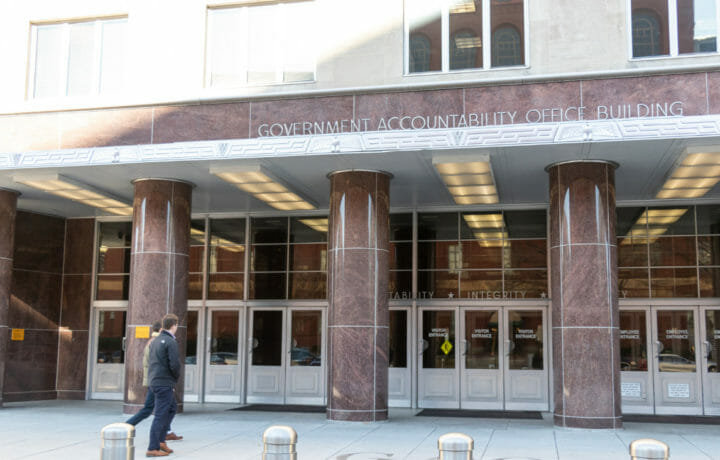The Government Accountability Office issued a report, “Cybersecurity: Kick-Starting the Office of the National Cyber Director,” in September 2022. The report highlighted the efforts of the National Cyber Director from June 2021 through its first year of existence. All in all, the GAO gave the Office of National Cyber Director (ONCD) a passing grade, noting that the ONCD’s “development of a national cybersecurity strategy by the administration is well underway.”
Office of the National Cyber Director Goals
The Office of the National Cyber Director’s creation occurred during Fiscal Year 2021, as did the appointment of the first National Cyber Director, Christopher Inglis. His role is to be “principal advisor to the President on cybersecurity policy and strategy, and cybersecurity engagement with industry and international stakeholders,” according to the White House.
Fiscal Year 2022 is the build out year. The White House noted, that the ONCD would acquire staff and put together their capabilities to support the “whole-of-nation” effort in cybersecurity. In October 2021, the beginning of FY2022 the “Strategic Intent Statement for the Office of the National Cyber Director” was issued, in which the vision, challenge, and path forward were discussed.
The Vision
The vision is to provide digital connectivity to “unite the country and the globe, in an open, interoperable, secure, and reliable internet.” The identified challenge lies within the complexity of computers and networks which are integral to our daily lives, which are easy for “malign actors to hide in and exploit.” The path forward includes, addressing four outcomes:
- ensure federal coherence;
- improve public-private collaboration;
- align resources to aspiration; and
- increase present and future resilience
GAO Report Feedback
The GAO report highlights the accomplishments of the ONCD, including the “seven lines of effort” designed to ensure four desired outcomes.
The lines of effort were identified within the GAO report as:
- National cybersecurity: Protect and defend state, local, and private sector networks.
- Federal cybersecurity: Ensure the federal government serves as a model for the private sector actors to follow.
- Budget review and assessment: Partner with the Office of Management and Budget to support departments and agencies as they plan and budget their cyber resources.
- Technology and ecosystem security: Encourage collaboration between the public and private sectors to develop a more secure digital supply chain.
- Planning and incident response: Ensure a coordinated federal defense from and response to cyber incidents.
- Workforce development: Ensure public and private sectors benefit from inclusive pathways for cyber talent.
- Stakeholder engagement: Work with Congress and the private sector on cyber initiatives.
The report also notes how the ONCD has approximately 55 employees as of late-August 2022 and is expected to grow to 75 employees prior to the end of FY2022. The GAO closes with, “The federal government needs to fully develop and implement a comprehensive national strategy in order to have a clear roadmap for overcoming the cyber challenges facing our nation.” To that end, in May 2022, the Office named three individuals to senior positions, and in July 2022, named a fourth. Then in on August 30, 2022, the White House announced a gaggle of senior assignments. These individuals and their positions were identified as:
- Camille Stewart Gloster as Deputy National Cyber Director for Technology and Ecosystem Security
- Jen Berlin, Assistant National Cyber Director for Stakeholder Engagement:
- Caroline Chang, Senior Advisor to the National Cyber Director and Executive Secretary:
- Drenan Dudley, Assistant NCD for Budget Review and Assessment
- Jose Fontanez, Special Assistant to the NCD
- Benjamin Haas, Principal Senior Advisor to the NCD
- Jim Halpert, General Counsel
- Michael Hochman, Deputy Chief of Staff and Deputy General Counsel
- Harry Krejsa, Assistant NCD for Strategy and Research
- Lorand Laskai, Deputy Assistant NCD for Strategy and Research:
- Nicholas Leiserson, Assistant NCD for Cyber Policy and Programs:
- Faith Lowe, Deputy Assistant NCD for Stakeholder Engagement:
- Xavier Ortega, Special Assistant to the Deputy NCD for Strategy and Budget:
- Elliott Phaup, Legislative Affairs Advisor:
- Gevin Reynolds, Special Advisor to the NCD:
- Haley Ring, Special Assistant to the Principal Deputy National Cyber Director
- Hannah Suh, Special Advisor to the NCD:
- Stephen Viña, Assistant NCD for Legislative Affairs




